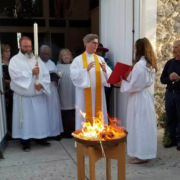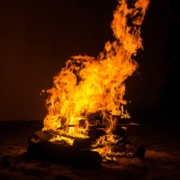VIGIL of EASTER
 Holy Saturday – The Saturday after Good Friday, which recalls the day when the crucified Christ visited among the dead while his body lay in the tomb of Joseph of Arimathea. In the Episcopal Church there is no eucharist on Holy Saturday. The BCP provides a simple liturgy of the word with collect and readings for the Holy Saturday service. The funeral anthem “In the midst of life” (BCP, pp. 484 or 492) is used instead of the prayers of the people (BCP, p. 283). In the ancient church, those preparing for baptism and perhaps others continued the fast they began on Good Friday. Holy Saturday ends at sunset. Fasting and other preparations end at sunset or with the Easter Vigil, which begins the celebration of Easter. See Triduum; see Easter Vigil.
Holy Saturday – The Saturday after Good Friday, which recalls the day when the crucified Christ visited among the dead while his body lay in the tomb of Joseph of Arimathea. In the Episcopal Church there is no eucharist on Holy Saturday. The BCP provides a simple liturgy of the word with collect and readings for the Holy Saturday service. The funeral anthem “In the midst of life” (BCP, pp. 484 or 492) is used instead of the prayers of the people (BCP, p. 283). In the ancient church, those preparing for baptism and perhaps others continued the fast they began on Good Friday. Holy Saturday ends at sunset. Fasting and other preparations end at sunset or with the Easter Vigil, which begins the celebration of Easter. See Triduum; see Easter Vigil.
Easter Eve – The Saturday before Easter. In the early church it was a day of fasting and preparation for the Easter Vigil. There is no celebration of the eucharist on this day, in accordance with church tradition. The term “Easter Even” was used by the 1549 Prayer Book. The 1979 BCP uses the title “Holy Saturday” for the Saturday before Easter (p. 283). The title distinguishes this day and its proper liturgy from the Easter Vigil. See Holy Saturday.
Easter Vigil – The liturgy intended as the first (and arguably, the primary) celebration of Easter in the BCP (pp. 284-95). It is also known as the Great Vigil. The service begins in darkness, sometime between sunset on Holy Saturday and sunrise on Easter, and consists of four parts: The Service of Light (kindling of new fire, lighting the Paschal candle, the Exsultet); The Service of Lessons (readings from the Hebrew Scriptures interspersed with psalms, canticles, and prayers); Christian Initiation (Holy Baptism) or the Renewal of Baptismal Vows; and the Eucharist. Through this liturgy, the BCP recovers an ancient practice of keeping the Easter feast. Believers would gather in the hours of darkness ending at dawn on Easter to hear scripture and offer prayer. This night-long service of prayerful watching anticipated the baptisms that would come at first light and the Easter Eucharist. Easter was the primary baptismal occasion for the early church to the practical exclusion of all others. This practice linked the meanings of Christ’s dying and rising to the understanding of baptism.
Vigil – 1) A service at night prior to a major feast or other important observance. The vigil anticipates and begins the commemoration of the following day. It may allow the participants an opportunity to reflect on the meaning of the next day’s service. Scripture texts that will be used at the service on the following day may be introduced at a vigil. Christian vigils have been observed since the early years of the church. The Easter Vigil dates from at least the second century, and it is described in Hippolytus’s Apostolic Tradition. The candidates for baptism spent the night in vigil, where they listened to readings and instructions. At cockcrow, the baptismal water was blessed and the candidates were baptized. The pilgrim Egeria mentions a vigil at the tomb in Jerusalem on Good Friday in the fourth century. Ancient sacramentaries provide evidence of a Pentecost vigil. The 1662 BCP lists sixteen feasts that were preceded by a vigil. Although the Easter Vigil was not retained as a vigil by the 1549 Prayer Book, the 1979 BCP includes a rite for the Great Vigil of Easter (pp. 285-295). The 1979 BCP also provides for a Vigil of Pentecost (BCP, p. 227), which resembles the Easter Vigil in a simplified form. The BCP also includes prayers for a vigil prior to burial of the dead (BCP, pp. 465-466). Psalms, lessons, and collects from the burial service may be used at this vigil. The Litany at the Time of Death may also be used. The BOS provides vigils for Christmas Eve, the Eve of the Baptism of our Lord, and the Eve of All Saints’ Day or the Sunday after All Saints’ Day. The BOS also includes a Vigil on the Eve of Baptism and a vigil Service for New Year’s Eve (Eve of Holy Name). 2) The term may also indicate a watch in the presence of the body of a deceased person prior to burial. See Wake.
https://episcopalchurch.org/library/glossary/holy-saturday



